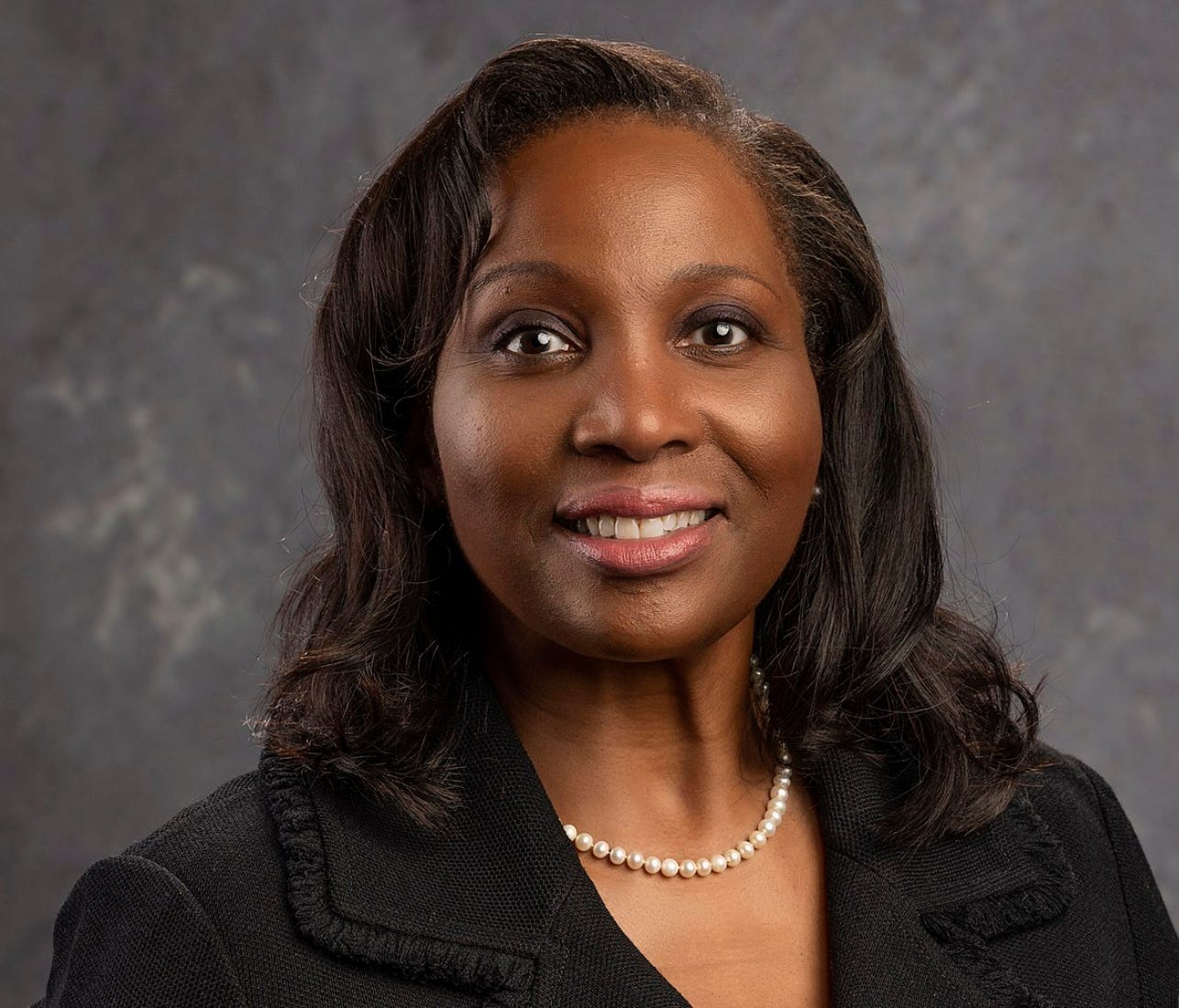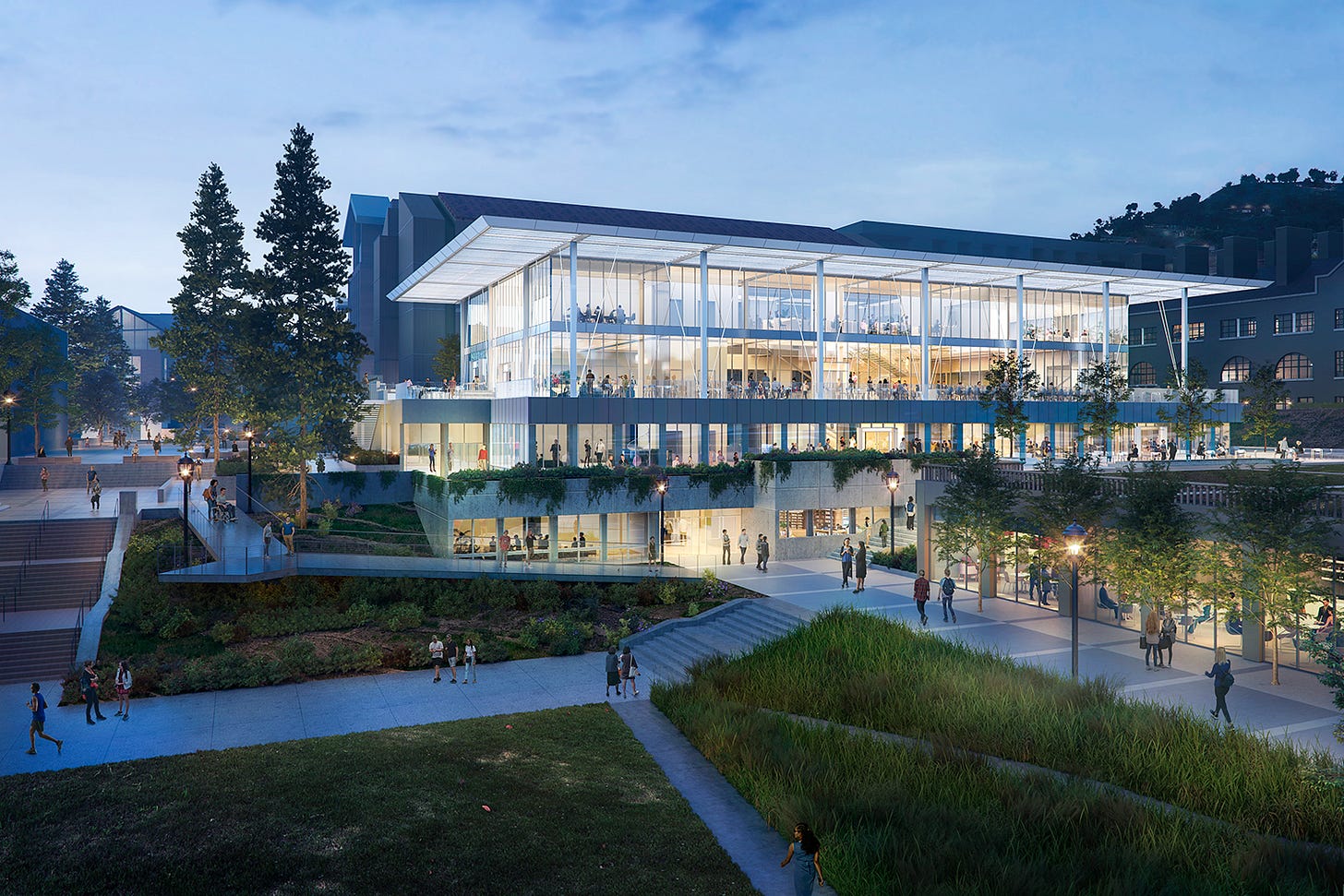READING: Things American Universities Do Right: Lisa Cook Believes She Is One
Lisa Cook, who was just finishing up as a student at Berkeley when I arrived as a professor, and who survived an attack by the right-wing slime machine to get confirmed as a Governor of the Federal Reserve, has things to say…
The Official Federal Reserve System portrait:
Apropos of her remarks, I must say that Evans Hall continues to be a pit—as Lisa quotes from Berkeley’s own assessment “a dark, closed-in design… spoiling the main east-west axis of the campus…”—and that the eating hole between Bechtel Enginering and Evans was worse, only slightly redeemed by the very large cookies it served. Fortunately, the eating hole is now gone, and there had better be a better one in the replacement Grimes Engineering Center building that should open any day now:
But this “architect’s drawing” viewpoint of Grimes when it will be finished is completely fake to the reality of the campus—at least until after Evans Hall comes down, supposedly in 2030.
Here is the real picture, back a year ago, from as close to the POV as I can get in Google Earth <https://earth.google.com/web/search/Bechtel+Engineering+Center,+Berkeley,+CA/@37.87334562,-122.25823927,107.99944776a,111.50299201d,35y,13.0286944h,72.2500981t,0r/data=CiwiJgokCRM25cZvS0RAERQ25cZvS0TAGSREX9_Cr0xAIe-rUQ1sE03AQgIIAToDCgEwQgIIAEoNCP___________wEQAA>:
Back in Lisa’s day, Evans looked even worse: They hadn’t painted it in decades, and pieces of the exterior concrete and windowpanes would occasionally slough off and fall down to the earth from as high as 130 feet. (The windowpanes would be replaced—the exterior concrete, not. “Deferred maintenance” as a revenue source.)
I had not known that Greg Grossman had postponed his retirement to advise Lisa…
Lisa Cook:
No matter when you attended Cal or how long you have been away, I think we can all agree that Berkeley is a special place that stays in your heart. I grew up in the South, and by the time I arrived at Berkeley, I had the good fortune to have spent time living in Africa and Europe.
Even with this experience, what immediately stood out to me was the campus’s openness to many different cultures and ideas.
And a clear way this was expressed, as I am sure you will recall, was through the abundance of delicious food. Berkeley was truly like heaven for this former founder of a cooking school. Better coffee and cuisine than anywhere else in the country. Dim sum everywhere, vegan and vegetarian options galore, and that sourdough at Great Harvest Bread. (You cannot blame a hungry grad student for stopping in for samples.) When I was there, Berkeley was at the forefront of the farm-to-table and healthy eating movements. I remember being in awe of the produce at Berkeley Bowl. They had five or six types of yams and sweet potatoes. I am from Georgia, and I had never seen so many yams!
The wonderful food served as a perfect canvas upon which to share ideas.
Sometimes that was having dinner at each other’s apartments, and sometimes it was slipping over to the cafeteria between Bechtel and Evans to have lunch with my friends in engineering and computer science. Shockingly, the Cal engineers had nicer facilities than the econ students in Evans Hall. By the way, Evans Hall is described on Cal’s own websites as a “dark, closed-in design… spoiling the main east-west axis of the campus.” Ouch, but I told you, open to ideas!2
From these lunches and many other conversations at Berkeley, I learned the value of exchanging ideas and the free disposal of ideas. The next idea will come; be unafraid to try new things. Do not be wedded to bad ideas. I learned the value of working in teams and acknowledging and leveraging everyone’s varied scholarly and lived expertise. I learned the value of sharing and collaboration. This fosters the spirit of innovation that drives the Bay area. You can see why many of the greatest advancements in the past century have come from that region of the country, many directly from Cal alumni.
It was awe-inspiring to be surrounded by so many outstanding students and stellar faculty members from many disciplines. The work of Cal researchers has changed the world. I often wondered what inspired these great minds. Then one day, while traversing the always congested campus, I saw it—the real incentive for great minds: Nobel laureates received reserved parking spaces. All of you who have fought Bay Area traffic and Berkeley campus parking restrictions know that tops any prize you can receive in Sweden!
But seriously, I was extremely lucky to have an amazing group of professors and supporters at Cal.
Barry Eichengreen was my dissertation adviser, and George Akerlof was an informal adviser who was just curious about economies undergoing market transitions. Janet Yellen and Laura Tyson were inspirations. They epitomized the commitment to public service that flows through the Berkley campus. When I arrived, Dr. Tyson had recently left to become chair of President Clinton’s Council of Economic Advisers (CEA). Of course, Dr. Yellen would soon serve as chair of CEA as well as those of Fed chair and Treasury Secretary, the only person in history to hold all three positions. I had the mentorship and support of a whole bunch of Romers: Christina, David, and Paul. Christina would also serve as CEA Chair as we climbed out of the Global Financial Crisis
I arrived on campus in 1991 the very week the Soviet Union started breaking up and the Russian Soviet Socialist Republic became just Russia. This series of events gave the world an unfiltered view of a Russian economy blinking into the sunlight after decades of central planning and stagnation. I asked, what would happen next, and what could we learn from this historic event? I was desperate to explore those questions and to explore them with Greg Grossman. No one in the world knew more about the Soviet and Russian economies than he did.
However, he had other thoughts—namely, retirement. When I asked him to advise me, he was hesitant. So, he presented me with a challenge. He said the only way to study the Russian banking system and economy was to become fluent in Russian. If I could learn the language, he would delay his retirement to advise me, along with Eichengreen. I could tell he thought his retirement plans were safe with that lofty goal. A year and a half later, I walked into his office and struck up a conversation in Russian. I could see his heart sink. I had won the challenge. (What he did not know then was that I had already learned four other languages and was blessed with the ability to pick up new ones quickly.) Once he agreed to stay on, I was off and running.
I plowed through Tsarist-era statistical tables stashed in the depths of Bancroft Library. Later, I would travel to Moscow and collect data from the Russian Statistical Agency and eventually survey and conduct interviews with Russian bankers and entrepreneurs. I credit my Berkeley professors, particularly Barry, Greg, George, and Paul, for supporting the curiosity that took me to Moscow and many other distant places to do research and push forward the field of economics with new questions, data, and analysis. I especially thank them for asking tough, thoughtful questions that prepared me to approach any situation of heightened uncertainty and in which standard models and the conventional wisdom in economics may not apply.
One aspect that stood out about the Berkeley experience was that we defended our dissertations at the proposal stage rather than upon completion. This arrangement was not common at the time but is now becoming a more frequent practice at other schools. It sets up the dynamic of these experienced, knowledgeable professors looking for constructive ways to allow experimentation to ultimately bring ideas to fruition. It is this sense of collaboration and openness that I have taken from Berkeley and brought with me everywhere I have gone—through universities, banks, the government, and now at the Federal Reserve…
Her biography from winter 2020:
Lisa D. Cook is Professor of Economics and International Relations at Michigan State University. She was the first Marshall Scholar from Spelman College and received a second B.A. in Philosophy, Politics, and Economics from Oxford University. She earned a Ph.D. in economics from the University of California, Berkeley with fields in macroeconomics and international economics. Prior to this appointment, she was on the faculty of Harvard University’s Kennedy School of Government, Deputy Director for Africa Research at the Center for International Development at Harvard University, and a National Fellow at Stanford University. Among her current research interests are economic growth and development, innovation, financial institutions and markets, and economic history. Dr. Cook is a Research Associate at the National Bureau of Economic Research and is the author of a number of published articles, book chapters, and working papers. She is on the Board of Editors of the Journal of Economic Literature, and her research has appeared in such journals as the American Economic Review and the Journal of Economic Growth. This research has been funded by the National Science Foundation, the National Bureau for Economic Research, the Smithsonian Institution, Harvard Business School, and the Economic History Association, among others. She is currently Director of the American Economic Association Summer Program and was President of the National Economic Association from 2015 to 2016. In 2019, she was awarded the Impactful Mentor Award (for mentoring graduate students) by the American Economic Association Mentoring Pipeline Program and was elected to the Executive Committee of the American Economic Association. During the 2011-2012 academic year, she was on leave at the White House Council of Economic Advisers under President Obama and has had visiting appointments at the National Bureau of Economic Research, the University of Michigan, and the Federal Reserve Banks of New York, Chicago, Minneapolis, and Philadelphia. She serves on the Advisory Boards of the Federal Reserve Bank of Chicago (Academic Advisory Council), the National Science Foundation (Social and Behavioral Sciences), the Opportunity and Inclusive Growth Institute of the Federal Reserve Bank of Minneapolis, and the Lemelson Center for the Study of Invention and Innovation of the Smithsonian Institution. She is a member of the Council on Foreign Relations. Dr. Cook has been a Sigma Xi (Scientific Research Society) Distinguished Lecturer and was recently named an Edison Fellow at the US Patent and Trademark Office. She is a guest columnist for the New York Times (Economic View) and for the Detroit Free Press and a regular contributor on CNBC, MSNBC, and NPR. She speaks English, French, Russian, Spanish, and Wolof.
References:
Cook, Lisa D. 2025. “Cal Distinguished Alumna Award Acceptance Remarks”. April 15. Washington: Board of Governors of the Federal Reserve System. <https://www.federalreserve.gov/newsevents/speech/cook20250415a.htm>.
Cook, Lisa D. 2020. “Biography and Curriculum Vitæ”. h<ttps://lisadcook.net/bio-cv/>.



